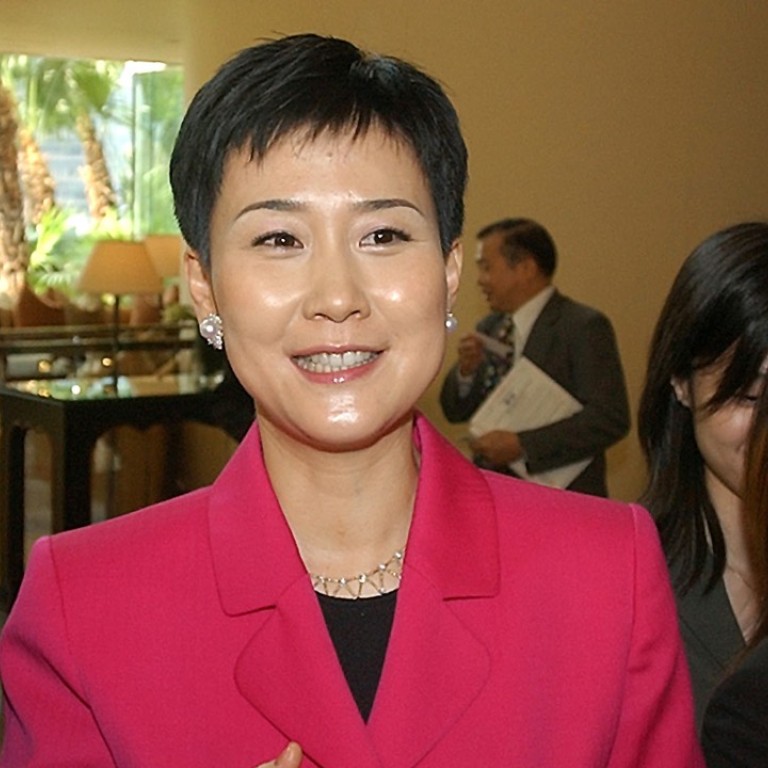
New | Shares in nuclear power company formerly run by ex-premier Li Peng’s daughter surge 20 per cent in wake of her resignation
Shares in the nuclear power company formerly run by the daughter of ex-premier Li Peng skyrocketed by almost 20 per cent as the Hong Kong market opened today in the wake of her shock resignation.
China Power New Energy Development shares jumped about 19.35 per cent to HK$0.74 on the Hong Kong stock exchange on the news of Li Xiaolin’s resignation and the transfer of all nuclear power assets and businesses from State Nuclear Power Technology Company to the company.
Previously they had been trading at around HK$0.60.
The agreement between China Power and State Nuclear Power was struck on December 30 and will involve the payment of shares and cash for the latter’s assets.
Li, dubbed China’s “power queen”, quit her job as a result of personnel rearrangement by the State Assets Supervision and Administration Commission (Sasac), the company said.
The resignation took effect on Wednesday and Wang Binghua would take on the role as the company’s chairman, it said.
READ MORE: Top power industry job for Li Xiaolin, daughter of former Chinese premier
It is believed the personnel changes at China Power New Energy Development will pave the way for a back-door listing, under which the mainland leadership hopes to publicly trade the country’s key nuclear power assets, according to Shanghai-based online news portal Thepaper.cn.
Li, 54, former vice-president of China Power Investment Corporation (CPI) was transferred to China Datang Corporation after CPI merged with State Nuclear Power Technology – the country’s sole importer of foreign third-generation nuclear technology – in July to form the State Power Investment Group.
It came as a surprise to industry insiders when Sasac did not assign Li a senior management role in the State Power Investment Group as she had been widely expected to lead the new entity.
She was also chairwoman of China Power International Development, a sister firm of China Power New Energy Development.
The personnel changes make sense because there was no role for Li to play
Li’s departure from the Hong Kong-listed China Power New Energy Development marks her complete departure from the State Power Investment Group and an official start of a restructuring of the group as Wang, also chairman of the new power giant, will have full authority in directing revamps, including a back-door listing in Hong Kong.
China Power New Energy Development said in a separate stock exchange filing that it had inked a preliminary agreement to acquire State Nuclear Power Technology, in what would be a major reverse takeover deal that would see the latter become publicly listed.
No purchase price was disclosed. It will be paid for by the issuance of an unspecified number of China Power New Energy shares at no less than 57 HK cents each, compared with the last-traded price of 62 cents before trading was suspended.
“The personnel changes make sense because there was no role for Li to play at State Power Investment Group,” said a private equity fund manager who declined to be named.
“It is obvious that Wang will be the key figure in restructuring all assets owned by the group.”
READ MORE: Flattering profile on Li Xiaolin, ex-premier’s daughter, draws flak amid ChinaLeaks revelations
Li worked at CPI for 12 years and was highly influential within the company given her family background.
After the merger, State Power Investment Group operated with combined assets worth nearly 700 billion yuan (HK$836 billion).
Datang is also one of the country’s largest power generators.
In July, Sasac described Li as a highly disciplined cadre with a strong sense of responsibility and who had high expectations of herself.
Her elder brother, Li Xiaopeng (李小鵬), who is now governor of coal-rich Shanxi (山西) province, was also a key player in the energy industry. He once served as the chairman of Huaneng Power International.

